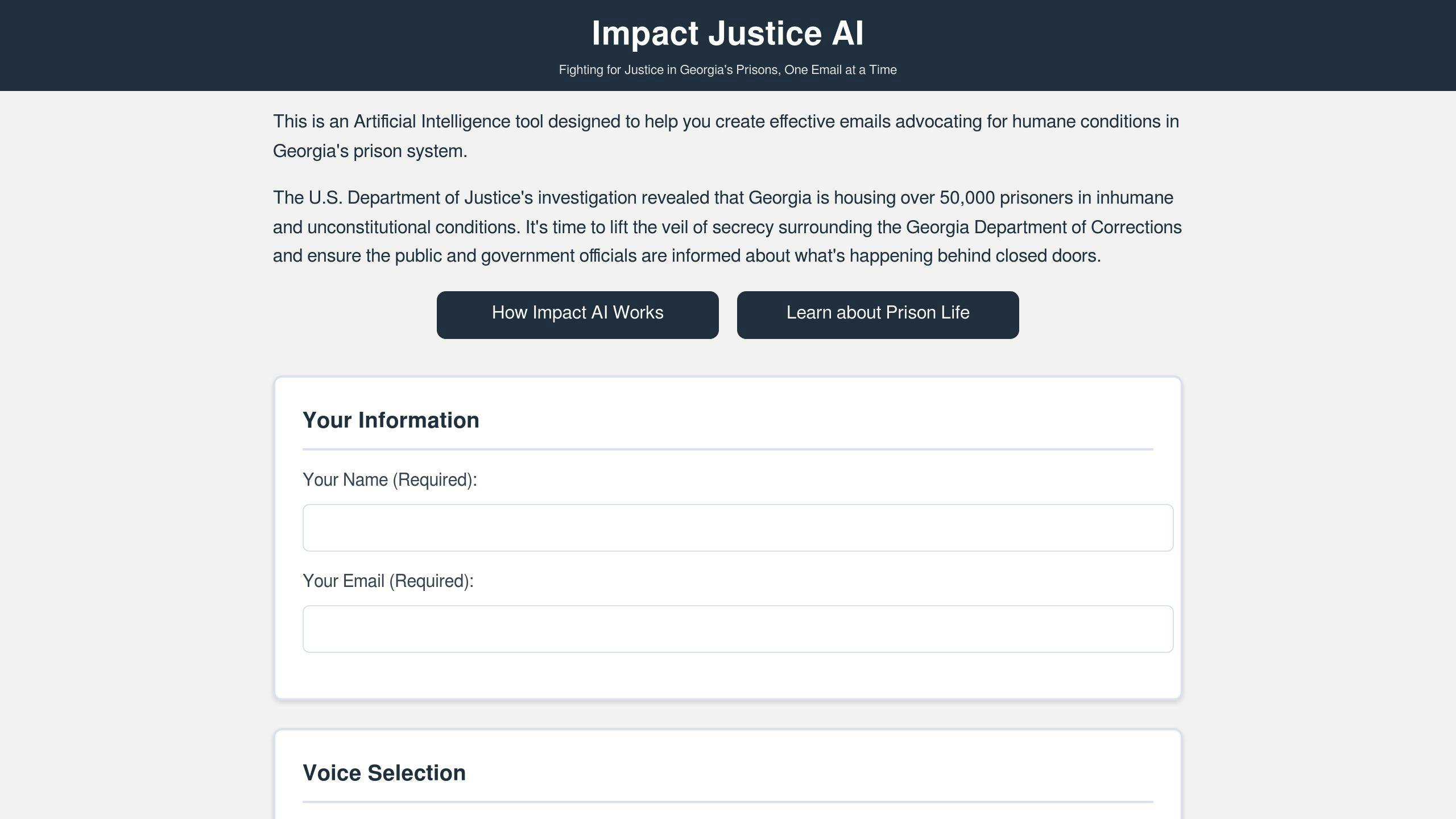Georgia’s prison system faces a crisis of secrecy, violence, and neglect. Hundreds of corrections officers have been arrested for crimes like contraband smuggling and abuse, while inmates endure unsafe, inhumane conditions. The lack of transparency allows corruption and misconduct to thrive, violating constitutional rights and eroding public trust.
Key Issues:
- Violence: Record homicides and unsafe conditions endanger inmates.
- Staff Shortages: Severe understaffing leads to poor supervision and increased risks.
- Lack of Oversight: Minimal public reporting and independent monitoring enable abuse to persist.
- Legal Failures: GDC has faced contempt rulings and fines for failing to protect inmates.
Why Transparency Matters:
- Accountability: Public reporting and oversight can expose misconduct and drive reform.
- Safety: Transparent practices protect inmates and staff from harm.
- Public Trust: Open systems rebuild confidence in a broken institution.
Proposed Reforms:
- Public Incident Reporting: Mandate timely reporting of violence, deaths, and emergencies.
- Independent Oversight: Establish bodies with full access to monitor and enforce compliance.
- Improved Communication: Allow inmates safe ways to report abuse and unsafe conditions.
Transparency is the first step toward fixing Georgia’s prisons. Without it, the cycle of violence and corruption will continue unchecked.
New DOJ report cites abuses in Georgia’s prisons
Understanding Georgia’s Prison System
Conditions Inside Georgia Prisons
Georgia’s prisons face serious challenges, marked by violence, drug issues, and a lack of staff. Investigations show record numbers of homicides, unchecked drug use, and severe staff shortages, all of which put inmates at risk [1]. With little oversight or accountability, these problems continue to grow.
In some cases, inmates endure degrading practices like being confined in "strip cells", a stark example of the harsh conditions within these facilities [2]. Without proper transparency, such inhumane actions persist.
| Area of Concern | Current Status | Impact on Inmates |
|---|---|---|
| Violence | Record homicides | Direct danger to inmates’ lives |
| Staffing | Severe shortages | Less supervision, increased risks |
| Basic Needs | Often unmet | Poor health and living conditions |
Failures of the Georgia Department of Corrections
The Georgia Department of Corrections (GDC) has repeatedly failed to address these issues. A federal judge recently held the GDC in contempt for violating a settlement meant to protect inmates in isolation units [2]. The result? Monthly fines of $75,000, underscoring the department’s ongoing inability – or unwillingness – to comply with oversight.
Even more concerning is the GDC’s response to evidence of misconduct. Instead of tackling the root problems, the department has worked to suppress information about prison conditions [3]. This focus on secrecy over meaningful reform raises serious questions about its priorities.
Effects on Inmates and Families
These failures don’t just affect those behind bars – they ripple out to families and communities. The Southern Center for Human Rights has documented cases where the lack of transparency harmed inmates’ well-being and made it harder for families to push for change [3].
The Department of Justice found that hundreds of GDC officers were involved in criminal activities, including crimes impacting people outside the prisons [4]. The GDC’s resistance to openness delayed the DOJ’s investigation, showing just how vital transparency is for accountability and reform.
These systemic problems highlight the urgent need for reforms that prioritize openness and accountability, ensuring inmate safety and rebuilding public trust.
sbb-itb-25113a2
Why Transparency is Necessary
Holding Officials Accountable
The Department of Justice has uncovered extensive misconduct among GDC officers, including arrests and dismissals for crimes like contraband smuggling. This highlights how secrecy can allow such behavior to continue unchecked [4]. GDC’s refusal to share documents during investigations blocks accountability and creates an environment where misconduct thrives [4]. Transparency is essential – not just to hold officials accountable but also to lay the groundwork for meaningful change.
Creating Pathways for Reform
Transparency shines a light on systemic problems that demand attention. For example, while contraband phones are illegal, they’ve inadvertently exposed abuses, emphasizing the need for legitimate ways to ensure oversight [3]. Transparency enables the documentation of abuse, promotes public awareness, and applies legal pressure to address these issues, as demonstrated by cases handled by the Southern Center for Human Rights [3].
Tools like Impact Justice AI can take these efforts further by analyzing misconduct patterns and offering actionable insights for change. By addressing systemic failures, transparency also plays a key role in restoring public confidence in a system riddled with corruption and neglect.
Rebuilding Public Trust
Georgia’s prison system has lost public trust due to its repeated failures to uphold the constitutional rights of incarcerated individuals.
"The Constitution’s protections do not stop at the prison walls, a basic truth that should not be lost on any government official." – Atteeyah Hollie, Deputy Director of the Southern Center for Human Rights [2]
Restoring trust starts with consistent openness. When officials resist investigations, public confidence deteriorates even more. Transparency is the only way to rebuild accountability. Modern tools, like AI-powered data analysis, can enhance transparency by identifying misconduct patterns and providing data-driven insights to support advocacy and improve prison conditions.
Policy Changes to Increase Transparency
Requiring Public Reporting
Public reporting is a key step in addressing the secrecy that allows abuse to persist. The Georgia Department of Corrections (GDC) needs a system that records and shares details about abuse, operational failures, and other critical issues, ensuring timely action. This system should mandate that incidents are documented and reported within 24 hours.
Here’s what such a system could track:
| Reporting Category | Frequency | Required Information |
|---|---|---|
| Incident Reports | Within 24 hours | Violence, deaths, medical emergencies |
| Facility Conditions | Monthly | Healthcare access, living conditions, staffing levels |
| Staff Conduct | Quarterly | Disciplinary actions, arrests, investigations |
| Population Data | Monthly | Occupancy rates, transfers, releases |
Creating Independent Oversight
To ensure accountability, Georgia’s prison system needs an independent oversight body. The current system’s shortcomings are evident in the GDC’s contempt of court ruling, which led to $2,500 daily fines for failing to meet conditions outlined in a settlement agreement aimed at improving the Special Management Unit [2].
This oversight body should have full access to facilities, the authority to conduct inspections and interviews, and the ability to enforce compliance by publishing findings and recommending penalties. These actions would promote consistent monitoring and genuine reform.
While structural changes are necessary, advocacy plays an essential role in driving these reforms forward.
Using Impact Justice AI for Advocacy

Impact Justice AI offers advocates a powerful way to push for reforms by creating tailored, evidence-based messages aimed at officials and the media. By integrating data into their communications, advocates can present stronger cases for increased transparency.
Advocacy efforts should emphasize:
- Documented violations of constitutional rights
- Specific examples of systemic failures
- Data-supported solutions
- Clear, actionable demands for policy changes
This tool ensures advocacy aligns with the push for transparency and accountability, helping to turn proposals into real, measurable reforms.
Conclusion: A Transparent Future for Georgia Prisons
Key Takeaways
Transparency is critical to addressing the deep-rooted issues in Georgia’s prison system. The Department of Justice’s investigation uncovered serious constitutional violations, widespread abuse, and the arrest of hundreds of Georgia Department of Corrections (GDC) officers for crimes like contraband smuggling, violence, and extortion [4]. These findings underline the need for openness to protect both inmates and the public.
Steps Toward Change
Turning awareness into action requires public involvement and advocacy. Tools like the Impact Justice AI platform help advocates create data-backed messages for officials and media, focusing on concrete evidence and actionable solutions.
| Action Step | Purpose |
|---|---|
| Support Advocacy Groups | Strengthen the efforts of human rights organizations |
| Use Impact Justice AI for Messaging | Develop fact-based communications for impact |
| Track Reforms | Keep an eye on court-mandated changes |
| Share Systemic Issues | Report problems through proper channels |
The Road Ahead
The Georgia Senate committee’s decision to study prison reform is a promising start, but meaningful progress depends on consistent public pressure [1]. Susan Burns from They Have No Voice points out the GDC’s resistance to transparency, stressing the importance of ongoing advocacy to bring systemic issues to light [3].
Achieving reform will require a combination of public advocacy, independent oversight, and a commitment to transparency. With these efforts, Georgia’s prisons have the potential to move from dysfunction to a system that upholds constitutional rights and ensures accountability.
